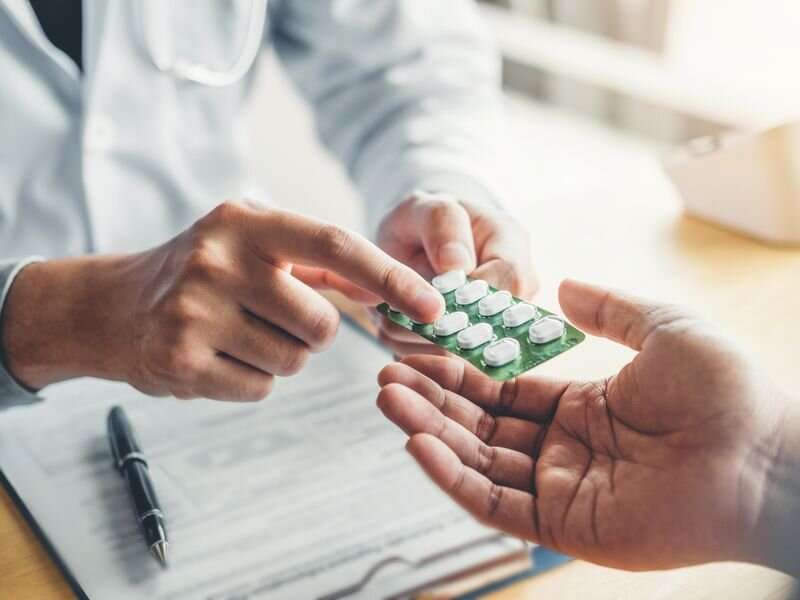This article has been reviewed according to Science X's editorial process and policies. Editors have highlighted the following attributes while ensuring the content's credibility:
fact-checked
peer-reviewed publication
reputable news agency
proofread
'Morning after' antibiotics could slash odds for common STDs

A "morning after" dose of a common antibiotic can greatly lower the chances of sexually transmitted bacterial infections in high-risk people, a new clinical trial has found.
Researchers discovered that taking the antibiotic doxycycline within 72 hours of unprotected sex slashed the risk of gonorrhea, chlamydia and syphilis by two-thirds among gay and bisexual men and transgender women who either had HIV or were taking medication to help prevent HIV.
The benefits at the one-year mark were considered so convincing that the trial was stopped early.
Experts said the findings, published April 6 in the New England Journal of Medicine, showed that the approach to prevention is "highly effective."
And that's needed at a time when sexually transmitted infections (STIs) are rising at a "scary" rate, said Dr. Colleen Kelley, an infectious disease specialist at Emory University in Atlanta, who was not involved in the trial.
For the past decade, the United States has seen a worrying comeback in bacterial STIs that had previously been on the decline. The trend continued in 2020, a year marked by pandemic restrictions: 2.4 million Americans contracted chlamydia, gonorrhea or syphilis, according to the U.S. Centers for Disease Control and Prevention.
And while that pattern cuts across demographics, men who have sex with other men have been disproportionately affected.
The new trial focused on certain groups who are at particularly high risk of bacterial STIs: Gay and bisexual men, as well as transgender women, who either had HIV or were taking HIV PrEP (prescription medication that helps prevent HIV) and had been diagnosed with a bacterial STI in the past year.
The researchers randomly assigned 500 participants to one of two groups: About two-thirds were given doxycycline and told to take a 200 milligram dose within 72 hours of unprotected sex; the rest stayed with their usual health care. All had STI testing done every three months.
Over one year, participants using doxycycline were two-thirds less likely to be diagnosed with a bacterial STI. In that group, the incidence of STIs every three months was around 11%—versus over 30% in the comparison group.
Preventive doxycycline was most effective against chlamydia and syphilis—cutting the risks of those infections by close to 90% in HIV-negative people, and by well over 70% in those with HIV. The efficacy against gonorrhea was less, but those infections were still cut by 55%.
"It's exciting to have another tool in the toolkit to prevent these infections," said lead researcher Dr. Annie Luetkemeyer, a professor of medicine at the University of California, San Francisco.
"We've tried relying on condom use," she said. "But business as usual is not working."
That said, Luetkemeyer stressed that any STI preventive measure should be seen not as a magic bullet, but as "part of a package"—which may include condom use, frequent STI screening and vaccination against hepatitis B, for instance.
Luetkemeyer underscored another point: The trial involved specific groups at high risk of bacterial STIs, and no one is saying that everyone should take doxycycline after having unprotected sex.
One concern is that wider use of the antibiotic could increase bacterial resistance to doxycycline and other antibiotics in its class.
But there has never been any documented resistance of syphilis or chlamydia to doxycycline, said Kelley, who is also vice chair of the HIV Medicine Association's board.
Some gonorrhea strains, however, are resistant to the antibiotic. And Kelley said it's possible that with time, morning-after doxycycline will become less effective in preventing gonorrhea.
On the positive side, both doctors said, doxycycline is not used to treat gonorrhea, so any increased resistance to the antibiotic should not hinder treatment of the STI.
Another question is how will regular antibiotic use affect a person's own microbiome (the collection of bacteria that naturally dwell in the body). That will require more research, Luetkemeyer said.
But again, both doctors said, it's a matter of "balance." For people at such high risk of bacterial STIs—who would often be using antibiotics to treat them anyway—the benefits of preventive doxycycline could well outweigh the theoretical risk of altering the microbiome in a way that's harmful, Kelley noted.
At the moment, doxycycline is not routinely prescribed for STI prevention in high-risk individuals, Kelley said—though some city health departments (like San Francisco) and providers have embraced it.
The U.S. Centers for Disease Control and Prevention, she noted, is expected to soon release some guidance on the subject.
Luetkemeyer cautioned people against using doxycycline on their own by buying it online or using a friend's prescription.
"It's always advisable to talk to a doctor and make sure this is right for you," she said.
And for now, at least, Luetkemeyer said she would not recommend that cisgender women use doxycycline for STI prevention, even if they are at high risk.
This trial did not study cisgender (biological) women, but a recent trial in Kenya did and found that for young women using HIV PrEP, morning-after doxycycline did not cut the risk of bacterial STIs.
The reasons, Luetkemeyer said, are unknown at this point.
More information: The U.S. Centers for Disease Control and Prevention has more on STD prevention.
Copyright © 2023 HealthDay. All rights reserved.



















